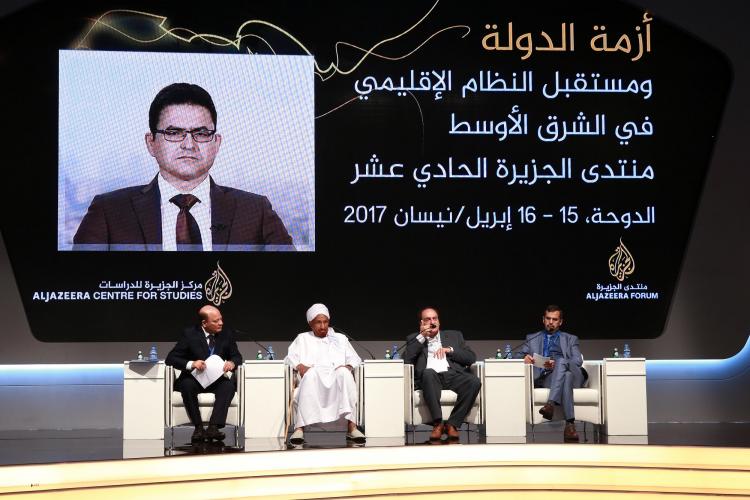The Arab Spring’s historical perspective was at the heart of discussion of the first plenary session at the 11th Al Jazeera Forum, “State Crisis and the Future of the Middle East”, in Doha on Saturday.
In a session titled, “The Arab State: Historical Context and Aspects of Current Crises”, speakers brought together ideas from different parts of the Arab region showcasing their rich knowledge of regional history.
Youssef Choueiri, a professor of history at the Doha Institute for Graduate Studies, launched the session by taking the audience back to the Roman era when Carthage, Tunisia came under attack by the Roman Republic which reduced it to ruins before rebuilding it as part of its empire. In doing so, he pointed out that Arab states have b
een destroyed time and again. He went on to give the examples of Egypt and Sudan, which were destroyed by internal and external forces.
The Arab state, according to Choueiri, has become a surplus state for the international community in the aftermath of the Arab Spring.
“We were all optimistic when it came to the Arab Spring but every single state had a conduct that reflected its idiosyncrasy as a movement. Similar popular movements had the same demands but one movement did not coordinate with the other, and there was no exchange of information”, he said, lamenting that it showed the tragedy of the Arab world. “The Arab world has lost its identity, its moral compass”.
Raising alarm, he also said, “We are delving into an era whereby Rome might come again and destroy the civilisation that was established by our ummah”.
As the discussion moved on to Sadiq Al-Mahdi, the former prime minister of Sudan and head of the National Umma Party, the theme progressed to why the Arab world is going through the ongoing crisis.
“The idea of nation state is modern and still feeble in the Arab world as it relies on succession. In such cases, coup d'etat is relevant, giving militants an upper hand”.
He went on to add that the state of the Arab League is a reflection of the feebleness of its members as Arab causes have been dealt with by non-Arabs.
Highlighting the importance of Turkey, Iran and Israel, Al-Mahdi said: “These nations are expanding and we need to have common stance on this expansion. We need to follow a strategy in order to compel Israel to understand our interests. We cannot have a united Arab world unless we reconcile.”
Al-Mahdi commented that nationalists calling for Arab unity have failed and those trying to implement the caliphate have also failed. He reiterated the need to understand sharia in a three-dimensional manner and for jurists to understand that fatwas need to be amended with changing times. The revolution, he said, must be a conceptual one as opposed to a political-versus-religious one.
The next expert on the panel was Mohamed Jabroun, a professor of history and researcher at the Regional Centre for Education in Tangier, who addressed the idea of homeland for different sets of people.
“For half a century, the Arab state was busy establishing ‘homelands’ such as Morocco, Algeria, Syria and so on. This kind of terminology paved the way for a new framework for states, which eventually led to a number of crises”, Jabroun said.
He went on to explain how the inception of such states and their eventual failure to deliver on the economic and development fronts made them illegitimate for their own citizens.
“There seems to be a lack of moral legitimacy in the eyes of the citizen. Hence, we have seen conflicts as these states are seen as authoritarian and not in line with the aspirations of their people”.
These factors, Jabroun asserted, have led to “a crisis of independence” within the region.
Mohamed Mahsoub, the former Egyptian Minister for Legal Affairs and member of the Parliamentary Council, was asked to comment on the reasons behind the so-called failure of the Arab Spring.
He opined that the failure of Arab unity cannot be linked to conspiracy theories alone. “The Arab world cannot press ahead without understanding international order, and by failing to do so, it turned into a hotspot of crisis as the entire region speaks one language, shares similar culture, and its societies are coherent”.
He also underlined that nation states work on the model of learning from mistakes but that in this region, some people preferred the idea of foreign intervention rather than accepting mistakes of the government or living under oppression.


